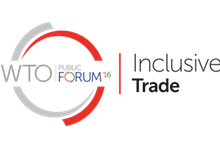Unlocking inclusive trade for SMEs through cross-border e-commerce
28 Sep 2016 17:00h - 18:30h
Event report
[Read more session reports and live updates from the 2016 WTO Public Forum.]
This session, organised by the World SME Forum, focused on the latest trends in cross-border e-commerce, as well as the impact it has on overall trade flows in developed and developing countries, and what small medium enterprises (SMEs) need to do to be ready to capture this opportunity.
Kati Suominen, Senior Adviser at the World SME Forum, and moderator of the session, remarked that e-commerce is a key enabler of SMEs in trade, labour productivity, and finance. She addressed questions on how e-commerce is changing the world, the needs and demands of developing countries, and the digital regulatory infrastructure that countries should have.
Brian Bieron, Executive Director at eBay Inc.’s Public Policy Lab, also talked about how e-commerce is dramatically changing the world and acts as a powerful global network for SMEs, enabling the to engage in the global value chain. He advised that the WTO should make a clear distinction between SMEs and micro enterprises. Bieron also noted that micro enterprises need to engage in payment and logistics platforms in order for their businesses to be included alongside SMEs, and to experience growth.
Anabel Gonzalez, Senior Director at the World Bank Group Trade and Competitiveness Global Practice, presented a study by Colombia University on the challenges faced by SMEs. She believes that ‘SMEs need to appear bigger to be credible in the global marketplace; e-commerce allows this with little money’. She introduced the World Digital Report by the World Bank that points out the need of an appropriate ecosystem in trade and the need of an analogy system in e-commerce. The World Bank is trying to work with governments on regulations related to e-commerce, and it encourages entrepreneurs from developing countries to participate in e-commerce.
Usman Ahmed, Head of Public Affairs at PayPal Inc., discussed how payment platforms can be leveraged. E-payment assumes that a person has an Internet connection and access to the relevant technology (computer, mobile phone or an ATM). Three requirements for SMEs to use e-payment services are: broadband access, proof of identity, and to be part of the formal economy (subject to taxes).
Daniel Crosby, Partner at King & Spalding, addressed issues on the building block of payment, trade, privacy, and consumer protection, which are not issues that the World Trade Organisation (WTO) focuses on. He noted that free-trade agreements (FTAs) exclude SMEs from developing countries and that there should be a way to allow those SMEs to be part of the FTA.
At the end of the session, a concern as to whether the WTO public forum is an adequate forum for SMEs was raised. The panellists agreed that the WTO is the right forum, as SMEs can improve the economy of nations and the WTO can help SMEs connect to the global trade.
by Aye Mya Nyein
Related event

